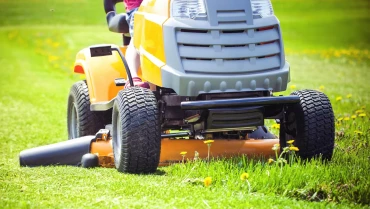The Serious Dangers of Lawn Mowers

Everyone wants their lawn to look great, especially in the spring and summer. That means that using a lawn mower is essential. While cutting the grass is relaxing for some and dull for others, one thing that they don’t often consider is just how dangerous lawn mowers can be. Injuries, some of them catastrophic, occur more frequently than you might think.
In fact, in a 2015 report, the Consumer Product Safety Commission (CPSC) stated that nearly 82,000 people suffered injuries related to lawn mowers and lawn tractors, many of them children. If you or a family member has been seriously injured by a lawn mower, you may be entitled to compensation for your injury – especially if the machine was found to be defective or not functioning properly.
The region has seen a rash of such injuries recently.
Just this week, a groundskeeper at Millersville University in Lancaster, Pa. died after he was injured in a fire while riding a lawnmower. Michael L. Keefer, 60, was mowing near the university’s football stadium when the fire broke out, according to news reports. The longtime university employee later died of the injuries.
Earlier this month, Eugene Novak, a retired fire officials in Bethlehem, Pa., sustained serious burns on more than half of his body and suffered multiple broken bones while using a riding lawn mower at his home. Novak had served the city’s fire department for 42 years before retiring in 2006.
Ross Feller Casey is currently litigating a high-profile case in federal court involving Daniel Fassett, a Towanda, Pa., man who suffered third-degree burns, and subsequently had his right leg amputated, after his Sears riding lawn mower exploded and caught on fire.
Common Injuries Caused by Malfunctioning or Defective Lawn Mowers
A lawn mower can cause injuries to both the person using it and anyone near it. For example, because the blades of a powered push lawn mower spin at very high speeds, it can cut or completely cut off fingers and toes. A riding lawn mower can overturn and crush the driver, resulting in serious injury or even death. Additionally, lawn mower blades can propel rocks or other objects on the ground at a high rate of speed, causing injury to whomever is in the path of the object. Lawn mowers can also cause serious burns when gasoline is added to an already hot motor or if there is a design flaw in the fuel system.
Some of the common types of injuries caused by lawn mowers include:
- Injuries to the eyes, including blindness
- Traumatic brain injury
- Serious cuts or lacerations
- Serious burns
- Broken bones, including cracked ribs
- Muscle and tendon damage
- Mutilation or amputation of fingers, toes, hands, and feet
- Damage to internal organs, for example a lacerated liver or ruptured spleen
- Permanent disfigurement
- Injury to the spinal cord, including paralysis
- Vascular damage
- Death
All of the above injuries can occur when lawn mowers are used in an unsafe or careless manner. However, they can also happen when lawn mowers have defective safety features that are either inadequate or they fail to work. These types of injuries are foreseeable and usually preventable.
Who is Liable When Lawn Mowers are Defective or Malfunctioning?
Legal responsibility for injuries that result from lawn mower use depends upon the specific circumstances of the injury. In some circumstances, defective or malfunctioning conditions in a lawn mower create strict liability. Defects might include how the lawn mower is made or designed, or a lack of sufficient instructions and warnings that alert consumers of potential dangers.
Common Lawn Mower Defects
Although there are many ways that a lawn mower can be defective or malfunctioning, the following are some of the most common flaws:
- Defects that occur during manufacturing
- Defects in the design of the lawn mower
- Improper or insufficient warning labeling·
- Rollover defects – riding lawn mowers that overturn easily
- Parts that break easily
- Lack of proper or insufficient instructions
- Defective fuel system
- Defective blades
Manufacturing defects can cause catastrophic injuries to lawn mower operators, including death. Aside from operator error, lawn mower manufacturers have an obligation to make products that are safe. However, in order to be able to lower the price of some lawn mowers – especially the more expensive riding mowers – many manufacturers fail to provide the proper safety devices that will reduce the potential for injuries.
Find Help for Catastrophic Lawn Mower Injuries at Ross Feller Casey
If you or someone you love suffered serious injuries or burns while using a lawn mower, Ross Feller Casey has experienced product liability attorneys to evaluate your case. The evaluation is free and we handle all product liability cases, including lawn mower injury lawsuits, on a contingency basis. That means there is no cost to you unless a financial recovery is made.
Disclaimer: Ross Feller Casey, LLP provides legal advice only after an attorney-client relationship is formed. Our website is an introduction to the firm and does not create a relationship between our attorneys and clients. An attorney-client relationship is formed only after a written agreement is signed by the client and the firm. Because every case is unique, the description of awards and summary of cases successfully handled are not intended to imply or guarantee that same success in other cases. Ross Feller Casey, LLP represents catastrophically injured persons and their families in injury and wrongful death cases, providing legal representation in Pennsylvania and New Jersey.





